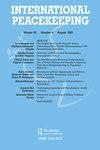Institutional Choice, Risk, and Control: The G5 Sahel and Conflict Management in the Sahel
IF 1.3
2区 社会学
Q2 INTERNATIONAL RELATIONS
引用次数: 7
Abstract
ABSTRACT Using institutional choice theory, this article seeks to explain why the G5 Sahel, an international organization that comprises Burkina Faso, Chad, Mali, Mauritania, and Niger, was created in 2014 and tasked to deal with conflict management in the Sahel through its Joint Force that was established in 2017. While the use of the theory offers crucial insights into the creation of the G5 Sahel, I also find that the theory overestimates the costs and risks attached to the creation of a new institution while underestimating the desire of states to maintain control over actions on the ground – at least when it comes to security questions.制度选择、风险与控制:萨赫勒五国集团与萨赫勒地区的冲突管理
运用制度选择理论,本文试图解释为什么萨赫勒五国集团(G5 Sahel)是一个由布基纳法索、乍得、马里、毛里塔尼亚和尼日尔组成的国际组织,于2014年成立,并通过2017年成立的联合部队负责处理萨赫勒地区的冲突管理。虽然该理论的运用为萨赫勒五国集团的创建提供了至关重要的见解,但我也发现,该理论高估了创建一个新机构所附带的成本和风险,同时低估了各国保持对实地行动控制的愿望——至少在涉及安全问题时是这样。
本文章由计算机程序翻译,如有差异,请以英文原文为准。
求助全文
约1分钟内获得全文
求助全文

 求助内容:
求助内容: 应助结果提醒方式:
应助结果提醒方式:


